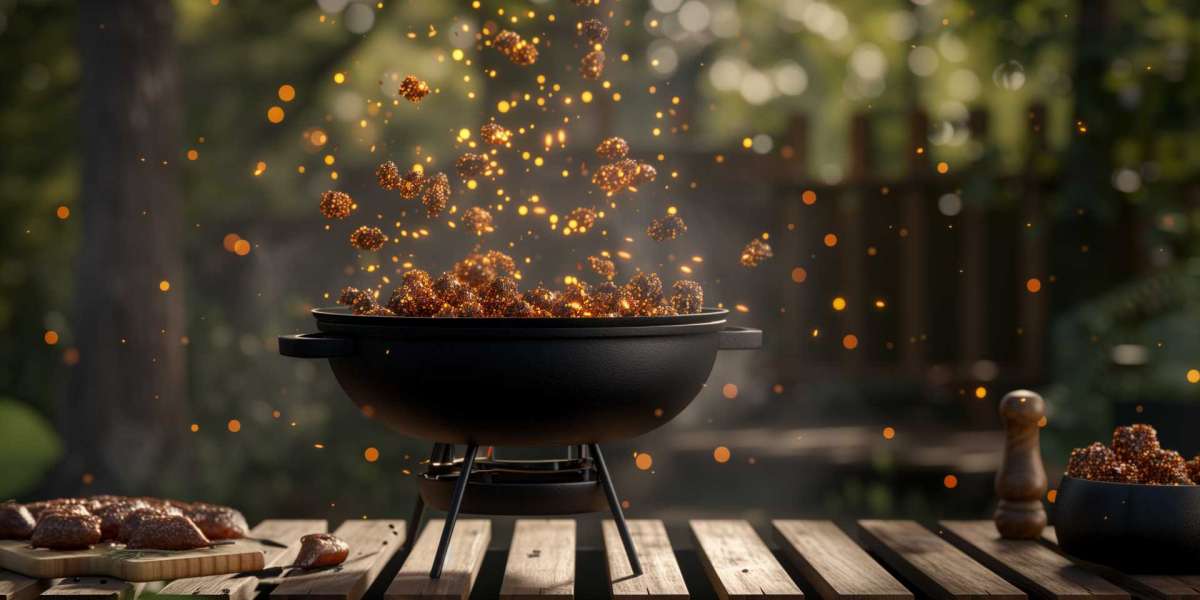A backyard barbeque is a quintessential summer tradition, bringing families and friends together to enjoy delicious food and good company. The heart of any backyard barbeque is the grill, and choosing the right one can elevate your outdoor cooking experience. With a plethora of options available, it can be overwhelming to decide which grill is the perfect fit for your needs. In this comprehensive guide, we'll break down the essential factors to consider when selecting the ideal barbeque grills for your backyard.
Types of BBQ Grills
Gas Grills:
- Pros: Easy to use, quick to heat up, and precise temperature control.
- Cons: Can be more expensive upfront and requires propane or natural gas.
Gas grills offer a convenient and efficient way to grill. They are easy to light, heat up quickly, and provide precise temperature control, making them ideal for both novice and experienced grillers. Gas grills come in a variety of sizes and styles, from small portable models to large, feature-packed grills. Consider your needs and budget when choosing a gas grill.
Charcoal Grills:
- Pros: Authentic smoky flavor, affordable, and versatile.
- Cons: Requires more effort to light and maintain, and can be messier.
Charcoal grills offer a classic grilling experience with a smoky flavor that can't be replicated by other types of grills. They are also more affordable than gas or pellet grills. However, charcoal grills require more effort to light and maintain, and they can be messier to clean. If you're willing to put in the extra effort, a charcoal grill can be a great choice.
Pellet Grills:
- Pros: Consistent temperature control, wide range of cooking options (smoking, grilling, baking, roasting), and minimal mess.
- Cons: Can be more expensive and requires wood pellets.
Pellet grills offer the best of both worlds: the convenience of gas grills and the smoky flavor of charcoal grills. They use wood pellets as fuel, which provide a consistent heat source and a wide range of cooking options, including smoking, grilling, baking, and roasting. Pellet grills are also relatively easy to clean, making them a great choice for busy families.
Electric Grills:
- Pros: Easy to use, clean, and ideal for apartment dwellers or those with limited outdoor space.
- Cons: Limited cooking power and flavor compared to gas or charcoal grills.
Electric grills are a great option for apartment dwellers or those with limited outdoor space. They are easy to use, clean, and require no fuel. However, electric grills can be limited in cooking power and flavor compared to gas or charcoal grills. If you're looking for a simple and convenient way to grill, an electric grill may be a good choice.
Key Factors to Consider:
Fuel Type:
- Gas: Convenient and easy to use, but can be more expensive in the long run.
- Charcoal: Traditional and flavorful, but requires more effort to light and maintain.
- Pellet: Versatile and consistent, but requires wood pellets.
- Electric: Clean and easy to use, but limited in cooking power and flavor.
When choosing a fuel type, consider your budget, lifestyle, and desired cooking experience. Gas grills are the most convenient and offer precise temperature control. Charcoal grills provide a classic grilling experience with a smoky flavor. Pellet grills are versatile and easy to use, while electric grills are the most convenient but offer limited cooking power and flavor.
Grill Size:
- Consider the number of people you typically grill for and the size of your backyard.
- A smaller grill is ideal for smaller families or occasional grilling.
- A larger grill is better for larger gatherings or those who love to grill frequently.
The size of your grill will determine how many people you can cook for at once. If you typically grill for small groups, a smaller grill will suffice. However, if you often host large gatherings or love to grill frequently, a larger grill will be more convenient.
Cooking Grates:
- Porcelain-coated: Durable and easy to clean.
- Cast iron: Excellent heat retention and searing capabilities.
- Stainless steel: Durable and rust-resistant.
The type of cooking grates you choose will affect the cooking performance of your grill. Porcelain-coated grates are durable and easy to clean, but they can be prone to chipping. Cast iron grates offer excellent heat retention and searing capabilities, but they require more maintenance. Stainless steel grates are durable and rust-resistant, but they can be more expensive.
Features:
- Side Burners: Useful for preparing side dishes or sauces.
- Warming Racks: Keep food warm while you cook.
- Smoker Boxes: Add smoky flavor to your food.
- Rotisserie Burners: Perfect for roasting whole chickens or pork loins.
Additional features can enhance your grilling experience. Side burners are great for preparing side dishes or sauces, while warming racks keep food warm until it's ready to serve. Smoker boxes add smoky flavor to your food, and rotisserie burners are perfect for roasting whole chickens or pork loins.
Budget:
- Set a realistic budget and research different grill options within your price range.
- Consider the long-term costs, such as fuel and maintenance.
It's important to set a realistic budget for your grill purchase. Consider the initial cost of the grill, as well as the ongoing costs of fuel and maintenance.
Maintenance:
- Easy-to-clean grills are ideal for busy lifestyles.
- Consider the frequency of cleaning and the type of cleaning required.
The level of maintenance required for your grill will depend on the type of grill you choose. Gas and electric grills are generally easier to clean than charcoal or pellet grills. Consider your lifestyle and how often you plan to grill when choosing a grill.
Tips for Choosing the Perfect BBQ Grill:
- Do Your Research: Read reviews, compare features, and ask friends and family for recommendations.
- Visit a Local Grill Store: Talk to experts and see different grill models in person.
- Consider Your Cooking Style: Think about the types of food you like to grill and the level of expertise you have.
- Prioritize Safety: Choose a grill with safety features like automatic ignition and flame tamers.
- Think About the Future: Consider your long-term grilling needs and choose a grill that will grow with you.
By carefully considering these factors, you can choose the perfect BBQ grill to elevate your outdoor cooking experience. Just like devoted fans cheering you on, the right grill can make all the difference in achieving mouth-watering results. Whether you're a seasoned griller or a backyard novice, there's a grill out there that's perfect for you. Happy grilling!
Additional Tips for a Memorable Backyard Barbeque:
- Plan Your Menu: Create a menu that complements your grill's capabilities.
- Prep Your Ingredients: Pre-marinate meats, chop vegetables, and have all your ingredients ready to go.
- Set the Mood: Create a festive atmosphere with music, lighting, and decorations.
- Don't Forget the Sides: Offer a variety of side dishes, salads, and desserts.
- Clean Up: Clean your grill after each use to prevent rust and buildup.
By following these tips, you can host unforgettable backyard barbeques that your guests will rave about.




